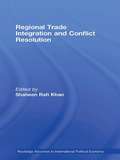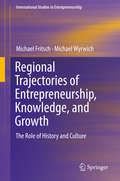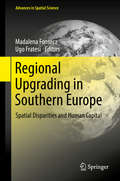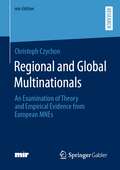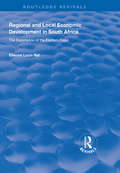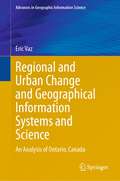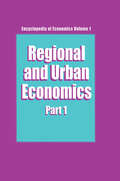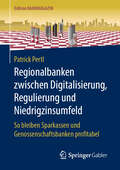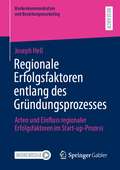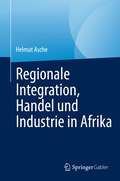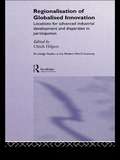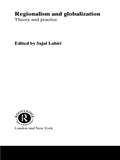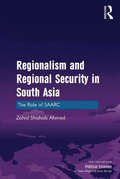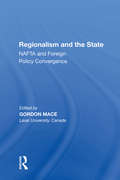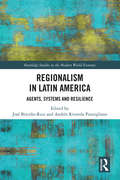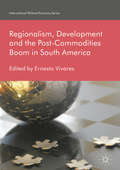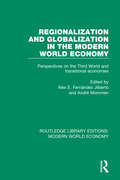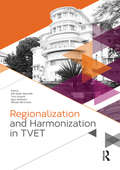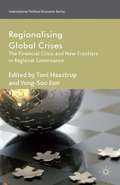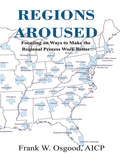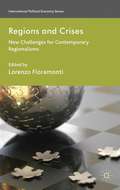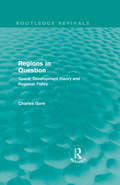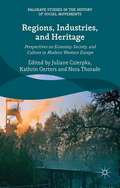- Table View
- List View
Regional Trade Arrangements
by International Monetary FundA report from the International Monetary Fund.
Regional Trade Arrangements in Africa
by Sanjeev Gupta Yongzheng YangA report from the International Monetary Fund.
Regional Trade Integration and Conflict Resolution (Routledge Advances in International Political Economy)
by Shaheen Rafi KhanThis volume addresses the growth of regional trade agreements (RTAs) which have mushroomed since the 1990s, and considers their potential as a tool for reducing inter- and intra-state conflict. Exploring the links between trade, conflict and peace in different and varying contexts, this book maps the extant RTAs in the region, analyses the factors which hinder or promote regional trade integration and considers their economic and political impacts. Presenting a series of case studies in four regions: South America; the southern African region; South Asia and South East Asia, the authors consider three key questions: What is the significance of the recent and rapid development of RTAs for peace building both within and between countries? To what extent do RTAs engender inter and intrastate conflict? To what extent are trade and RTAs hostage to conflict and is regional political stability a precondition for economic integration? Regional Trade Integration and Conflict Resolution will be of interests to students and scholars of trade, international relations and conflict studies. It will also be of interest to policy makers and NGOs.
Regional Trajectories of Entrepreneurship, Knowledge, and Growth: The Role of History and Culture (International Studies in Entrepreneurship #40)
by Michael Fritsch Michael WyrwichThis book offers a dynamic perspective on regional entrepreneurship, knowledge, innovation and economic growth, with a particular focus on the role that history and culture play. The authors provide comprehensive empirical analyses offering unique insights into the spatial patterns of long-term differences of regional self-employment, new business formation, cultures of entrepreneurship, innovation activities, and development. Policy implications from the analyses and a discussion of important avenues for future research complete this unique book combining history, culture, and entrepreneurship.This is a superb book with an original, historical take on entrepreneurship and regional development. It is a landmark study on Germany showing that regional levels of entrepreneurship are persistent and resilient, despite many disruptive shocks.Ron Boschma, Utrecht University, The Netherlands, and Stavanger University, NorwayThis book presents the distilled wisdom of two leading authorities on the link between entrepreneurship and economic prosperity at a regional level. Although its prime empirical focus is on Germany there are clear lessons for scholars and policy-makers in all high-income countries.David J Storey, University of Sussex, UK
Regional Upgrading in Southern Europe
by Ugo Fratesi Madalena FonsecaThe book is aimed at a wide audience, including academics, economic geography, spatila planning and regional policy researchers, institutional leaders and managers, natioanl and institutionla policy makers, practitioners, administrators, master's and senior bachelor's students on related courses, general readers. A list of courses and corresponding programmes in Geography, Planning, Economics and Management will be prepared later.
Regional and Global Multinationals: An Examination of Theory and Empirical Evidence from European MNEs (mir-Edition)
by Christoph CzychonBased on their ability to facilitate interdependencies across the borders of national and regional markets, multinationals enterprises (MNEs) act as the key drivers of world trade and investment activities. While recent global challenges additionally highlight the need to explain and assess the status and progress of internationality/-regionality, previous research renders the concept of firm-level globalization as a special but not the general case. Christoph Czychon dedicates specific attention to the research on regional and global MNEs based on an extensive and rigorous review of the existing academic literature as well as the analysis of 2005-2015 empirical data from the European context with a focus on CAC40- and DAX30-listed firms. In doing so, the author offers insights and results that stand in contrast to the original narrative of the debate and presents a comprehensive and updated perspective on regional and global MNEs.
Regional and Local Economic Development in South Africa: The Experience of the Eastern Cape (Routledge Revivals)
by Etienne Louis NelFirst published in 1999, this volume responds to the recent application of Local Economic Development around the world and examines its impact in South Africa in the wake of the nation’s recent political transition. Etienne Louis Nel observes how the initiative is taking on a dual form of community-led and authority-led initiatives. Nel explores the issue through areas including South Africa’s space economy, a case study of Stuttenheim and local economic development in East London.
Regional and Urban Change and Geographical Information Systems and Science: An Analysis of Ontario, Canada (Advances in Geographic Information Science)
by Eric VazThis book presents a systematic analysis of challenges in the field of Geographical Information Systems and Science, geographical analysis, and regional science for Ontario, one of the fastest-changing provinces in Canada and one of North America's largest economic hubs. In nine chapters, the book offers advanced spatial analysis techniques and digital data content to integrate Geographic Information Systems (GIS) as tools to tackle regional and urban challenges. The chapters address the following main topics: 1) state-of-the-art approaches for regional discrepancies, 2) investigations of available methods for advanced spatial analysis, 3) identification of regional patterns and land use dynamics, 4) availability of Web 3.0 data content for regions without standardized data, and 5) the limitations and challenges of urbanization and its impact on landscape, heritage and ecosystems. The volume is divided into four sections dealing with key issues in Ontario, each addressing the use of GIS for crucial regional decision-making. The book will be of interest to researchers, undergraduate and graduate students, planners, regional scientists, and policy makers.
Regional and Urban Economics Parts 1 & 2
by Richard J. ArnottA collection of the first section of the "Fundamentals of Pure and Applied Economics" series, "Regional and Urban Economics: Parts One and Two" is an encyclopaedia containing eight titles: This volume highlights original contributions in regional and urban economics, concentrating mainly on urban economic theory. The contributions focus on the treatment of space in economic theory. Drawing on the body of literature developed by Von Thunen, Christaller and Losch, these chapters explore empirical, theoretical and applied aspects of urban and regional economics which can be divided into the following areas: Location Theory, "Jean Jaskold Gabszewicz, Jacques-Francois Thisse, Masahisa Fujita "and" Urs Schwiezer"Urban Public Finance, "David E. Wildasin"Urban Dynamics and Urban Externalities, "Takahiro Miyao "and" Yoshitsugu" "Kanemoto"Systems of Cities and Facility Location,
Regionalbanken zwischen Digitalisierung, Regulierung und Niedrigzinsumfeld: So bleiben Sparkassen und Genossenschaftsbanken profitabel (Edition Bankmagazin)
by Patrick PertlDieses Buch befasst sich mit den Themen Digitalisierung, Regulierung und dem Niedrigzinsumfeld sowie deren jeweilige Auswirkungen auf den Sektor der Regionalbanken. Mit diesem Buch werden die aktuellen Entwicklungen und Rahmenparameter zusammenfassend dargestellt. Zudem werden Handlungsempfehlungen dafür gegeben, wie sich Regionalbanken hinsichtlich der aktuellen Entwicklungen noch besser operativ und strategisch ausrichten können. Um den aktuellen Status quo auch innerhalb der einzelnen Institute darstellen zu können, erfolgte zu den Themen Digitalisierung, Regulierung und Niedrigzinsumfeld eine Online-Befragung aller Regionalbanken, an der etwa zehn Prozent aller deutschen Regionalbanken teilgenommen haben.
Regionale Erfolgsfaktoren entlang des Gründungsprozesses: Arten und Einfluss regionaler Erfolgsfaktoren im Start-up-Prozess (Markenkommunikation und Beziehungsmarketing)
by Joseph HeßDie vorliegende Forschungsarbeit leistet grundlegende Arbeit bei der Verknüpfung weitreichend etablierter Forschungsergebnisse zur Erfolgsfaktorenforschung mit der noch jungen, aber zielführenden Idee, die Gründung eines Start-ups als Prozess zu verstehen und nicht als etwas, das in einem einzigen Augenblick stattfindet. Indem dem Gründungsprozess relevante Aspekte zugeordnet werden, können Entscheider und Einflussnehmer für sich Handlungsempfehlungen ableiten, um die Gründungsaktivitäten in ihrer Region zu fördern.
Regionale Integration, Handel und Industrie in Afrika
by Helmut AscheDieses Buch untersucht die Vergangenheit, die Gegenwart und die Perspektiven der regionalen wirtschaftlichen Integration in Afrika. Die empirische Analyse reicht von Gewerkschaften, die in den Jahren nach der Unabhängigkeit gegründet wurden, bis hin zur vorgeschlagenen Afrikanischen Kontinentalen Freihandelszone (AfCFTA), die darauf abzielt, Handelsbarrieren zwischen allen 55 afrikanischen Staaten zu beseitigen. Darüber hinaus wird untersucht, inwieweit die regionalen Wirtschaftsgemeinschaften (RECs) Afrikas gemäß einem linearen Integrationsmodell der Güter-, Arbeits- und Kapitalmärkte vorangekommen sind. Das Buch bewertet anschließend die Eignung des europäischen Modells einer tiefgreifenden Integration mit kostspieligen Institutionen für die spezifischen Bedingungen Afrikas, wobei beispielsweise die Rolle des informellen und nicht erfassten Handels berücksichtigt wird. Um die Logik der wirtschaftlichen Integration zu untermauern, werden stilisierte Fälle regionaler Arbeitsteilung mit steigenden Erträgen und unvollkommenem Wettbewerb vorgestellt. Frühere und aktuelle wirtschaftspolitische Maßnahmen in Afrika werden unter die Lupe genommen, um die Frage zu beantworten, wie afrikanische Regionen neue Fertigungsindustrien und Wertschöpfungsketten auf dem gesamten Kontinent am besten fördern können. Abschließend skizziert das Buch Inhalt und Verfahren der gemeinsamen Industriepolitik in den afrikanischen Regionen. Das Buch befasst sich auch mit dem kontroversen Thema der internationalen Handelsabkommen zwischen Entwicklungsländern und der Europäischen Union oder den USA und untersucht, ob diese Abkommen die wirtschaftliche Entwicklung in Afrika behindern oder fördern. Das Buch enthält einen detaillierten Fahrplan, in dem beschrieben wird, wie die Schlüsselklauseln der Abkommen über wirtschaftliche Partnerschaft im Interesse der afrikanischen Länder verbessert werden können. Abschließend wird eine neue Vision einer gemeinsamen nachhaltigen Entwicklung für Afrika und Europa skizziert.
Regionalisation of Globalised Innovation: Locations for advanced industrial development and disparities in participation (Routledge Studies In The Modern World Economy Ser.)
by Ulrich HilpertWhile processes of innovation are increasingly realised globally, they can also take a highly regionalised expression. In this book, the global networks that link regions are set against the local aspects of innovation. With contributions from international experts, this book examines local 'Islands of Innovation' where research and industrial expe
Regionalism and Globalization: Theory and Practice (Routledge Contemporary Economic Policy Issues Ser. #Vol. 1)
by Sajal LahiriThis volume brings together articles on three primary elements of globalization: multilateralism, regionalism and unilateralism. Expert contributors investigate the substantive issues of commodity and factor trade, capital movements and monetary and fiscal policies, from both theoretical and empirical perspectives.
Regionalism and Regional Security in South Asia: The Role of SAARC (The International Political Economy of New Regionalisms Series)
by Zahid Shahab AhmedZahid Shahab Ahmed evaluates the progress of the South Asian Association for Regional Cooperation (SAARC). This study goes beyond economic integration to present a detailed appraisal of cooperation under the overarching themes of economic cooperation, environmental security, human welfare, and cooperation in security matters. According to the author, SAARC is making progress in addressing the myriad of issues on its agenda. The transition from agreements to actions and frequent interactions among the member states has boosted confidence. The progress of SAARC is more evident in the less controversial areas of human security, such as poverty alleviation, health and safety, human resources development, and higher education. Notwithstanding enthusiastic commitments reflected in agreements and action plans, there is a gulf between rhetoric and implementation most notably in sensitive areas relating to traditional security. In the light of the findings of this study, the author proposes that greater cooperation in common human security areas has a potential to pave the way for a cooperation on issues of a ’contentious’ nature, particularly terrorism.
Regionalism and the State: NAFTA and Foreign Policy Convergence
by Gordon MaceEmpirically rich with highly detailed case studies on the North American Free Trade Agreement (NAFTA), this comprehensive volume studies the relationship between regionalism and state behavior. The traditional pattern of past studies of regionalism and regional integration has been to understand how state strategies molded the dynamics of an integration process. This study examines the impact of regionalism on the policy preferences of member states. This volume offers three theoretical contributions: � an empirical test of the convergence hypothesis � studies of institutions and their impact on domestic politics � an examination of foreign policy preferences and the neo-functionalist concept of 'spill-over' Recommended reading for students of regionalism, international political economy, international trade, foreign policy and North American studies.
Regionalism in Latin America: Agents, Systems and Resilience (Routledge Studies in the Modern World Economy)
by José Briceño-Ruiz; Andrés Rivarola PuntiglianoThis interdisciplinary edited volume explores the political economy of regionalism in Latin America. It identifies convergent forces which have existed in the region since its very conception and analyses these dynamics in their different historical, geographic and structural contexts. Particular attention is paid to key countries such as Argentina, Brazil and Mexico, as well as subregions like the Southern Cone and Central America. To understand the resilience of regionalism in Latin America, this book proposes to highlight four main issues. Firstly, that resilience is linked to mechanisms of self-enforcement that are part of the accumulation of experiences, institution building and common cultural features described in this book as regionalist acquis. Secondly, the elements and driving forces behind the promotion and expression of the regionalist acquis are influenced and shaped by nested systems in which social processes are inserted. Thirdly, when looking at systems, there is a particular influence by national and global ones, which condition the form and endurance of regional projects. Finally, beyond systems, the book highlights the relevance of agents as crucial players in the shaping of the resilience of regionalism in Latin America. This insightful collection will appeal to advanced students and researchers in international economics, international relations, international political economy, economic history and Latin American studies.
Regionalism, Development and the Post-Commodities Boom in South America
by Ernesto VivaresThis book is a critical and multidisciplinary IPE of the unequal structures of South American development and uneven insertions in the global order following the decline of the commodities boom. The work explores the extent to which regional development issues are related to merely a decline of commodities#65533; prices and/or to the resilience of the historical structures within an unequal world order. Thus, the authors seek first to analytically explore the regional issues beyond the formal limitations of North American and Eurocentric approaches. Secondly, they empirically scrutinize the complex dimensions of regional inequality and global insertions. Aspects analysed include economic reprimarization, the impact of China, development finance, trade and regional value chains, knowledge and technology, regional and transnational organised crime, cities, economic integration and the Global South.
Regionalization and Globalization in the Modern World Economy: Perspectives on the Third World and Transitional Economies (Routledge Library Editions: Modern World Economy)
by André Mommen Alex E. Fernández JilbertoOriginally published in 1998. This collection of outstanding essays explores the importance of regionalization and globalization to the world economy. International contributions explore the process of regionalization in the Pacific Area, The Americas, Africa and Europe, and question whether the world economy is characterized by increasing regionalization, rather than globalization. The book is an excellent contribution to debate on development economics. It investigates how the processes of globalization and regionalization, driven by liberalization of trade and capital markets, weaken nationally established monopolies and protected industries and it looks at the challenge to Third World nations and the countries of the former socialist bloc.
Regionalization and Harmonization in TVET: Proceedings of the 4th UPI International Conference on Technical and Vocational Education and Training (TVET 2016), November 15-16, 2016, Bandung, Indonesia
by Ade Gafar Abdullah, Tutin Aryanti, Agus Setiawan & Maizam Binti AliasRegionalization and Harmonization in TVET contains the papers presented at the 4th UPI International Conference on Technical and Vocational Education and Training (TVET 2016, Bandung, Indonesia, 15-16 November 2016). 1. Standardization in Regionalization and Harmonization2. Skill and Personal Development3. Social and Cultural Issues4. Teaching Innovations in TVET5. Innovations in Engineering and Education.
Regionalizing Global Crises
by Toni Haastrup Yong-Soo EunHow are global crises responded and dealt with? Are there any links between regionalism and global crises in terms of stimuli, processes, and consequences? This edited volume brings together a range of examples illustrating the development and importance of regional actors in the global governance of the political economy.
Regions Aroused: Focusing on Ways to Make the Regional Process Work Better
by Frank W. OsgoodRegions aroused focuses on practical solutions to congestion, inadequate housing, poor education, and mounting health and environmental problems in Los Angeles. The author based this fictionalized account on his own behind-the-scenes participation in political struggles among the region's leaders. Filled with passion for making the region more livable, the story plays out from the state legislature to citizen forums in individual cities, neighborhoods, and sub-regions. It grippingly portrays the forces of political intrigue, romance, betrayal, honor, and integrity that infuse public actions. In the 1999-2002 regional planning process recounted, the main characters rise above their political, professional, and personal tribulations to create a better Regions Aroused. The coverage and proposed solutions also apply to the 100-plus regions shown on the book's cover.
Regions and Crises
by Lorenzo FioramontiInvestigates the intimate relationship between regional governance processes and global crises. Analysing the current turmoil in the European Union, it also looks at regional cooperation and integration in the Arab world, Africa, Asia and Latin America through topical case studies.
Regions in Question: Space, Development Theory and Regional Policy (Routledge Revivals)
by Charles GoreOriginally published in1984. Regional development planning has grown rapidly in recent years, as both an academic specialism and a focus of policy and practice. Books and articles on the subject have proliferated, and all across the Third World governments have become commited to it, setting up large new departments and even ministries. Charles Gore argues that this growing popularity of regional planning in developing countries is profoundly paradoxical.
Regions, Industries, and Heritage
by Juliane Czierpka Kathrin Oerters Nora ThoradeThe industrial age has proved to be a formative period for Europe and has led to the emergence of differently structured regions. Some of these regions took a leading role in the process of industrialization, while others developed at a slower pace, started later or differed in the extent of their industrial development; our industrial heritage bears witness to the individual paths of development that have taken place since the late 18th century. The contributions to this volume take a regional perspective and focus on different stages of industrialization. Hence this volume not only allows comparisons to be drawn between different paths of industrial development, but also gives an overview of the different concepts of regions used among economic, social and cultural historians.

